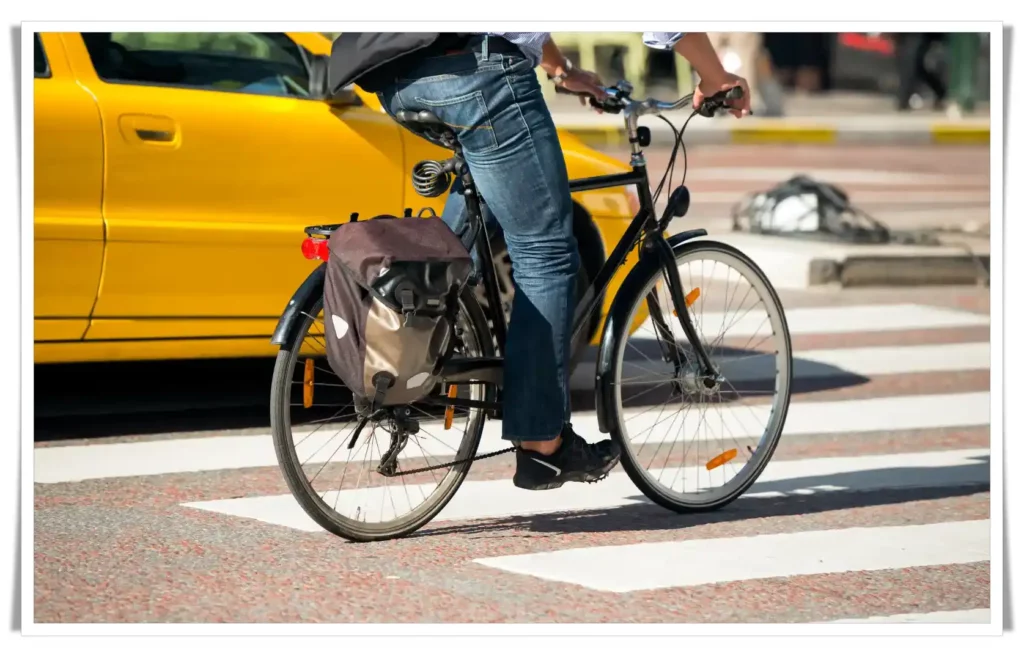Introduction
In an era where mobility is often equated with cars and motorised vehicles, there's a simple, sustainable, and health-beneficial alternative that's often overlooked – the bicycle. Today, we explore the many 'Biking Benefits' and give you '5 Reasons Why You Should Get Out Of The Car And Onto A Bike'. This shift in transportation mode is not only great for your wallet, but it's also a boon for your health, mindset, the environment, and surprisingly, your time management.
Empower Your Health Journey – Explore My Free Apps for a Vibrant, Healthier Lifestyle Today!
Save Money: Your Wallet Will Thank You
Choosing cycling as your primary mode of transport is akin to a masterstroke in personal finance management. The concept of swapping your car commute for a bike ride can lead to a profound economic shift that's felt directly in your pocket. The effects of this switch manifest themselves in a number of significant and pleasantly surprising ways.
Firstly, let's talk about the acquisition cost. When comparing the price tag on a bicycle with that of a car, it's clear that there's a vast difference. A good-quality bicycle, even one designed for rugged endurance and equipped with top-tier components, still costs a fraction of what you'd typically spend on a car. This is especially significant if you consider the costs of a new car, but it's still applicable when looking at used vehicles.
However, the financial benefits of biking don't stop at the point of purchase. Unlike motor vehicles, bicycles are free from many of the ongoing costs that add up over time. There's no petrol to buy – your fuel is the food you consume. The road tax that car owners must pay annually? There's none of that for cyclists.
Maintenance for a bicycle is also remarkably cheaper than a car. While cars often require professional servicing for various complex components, most bike maintenance tasks are simple enough to handle yourself with a basic set of tools. Even if professional service is needed, it's still a drop in the ocean compared to car repairs.
And let's not forget parking fees. For many city dwellers and workers, these fees can add up significantly over time. However, with a bike, you can often park for free, and due to the compact size of bicycles, finding a suitable parking spot is generally a much easier task.

When these elements are all added up, the cost of pedalling yourself to your destination is considerably lower than driving there. Over time, this simple act could save you a significant amount of money annually. In the challenging economic climate that many of us are experiencing, who wouldn't welcome such financial breathing space? The journey to better financial health could well start with choosing two wheels instead of four.
Improve Your Health: A Fun Workout On Wheels
In our modern lifestyle, characterised by long hours of office work, constant screen exposure, and increasing levels of stress, our health often takes a back seat. Amid the hustle and bustle, the crucial aspect of daily exercise becomes an easy target for neglect. But imagine transforming your mundane commute into a fun and effective workout session. That's precisely where the brilliance of cycling comes into play. Biking to work, the local grocery store, or even to meet friends can be an enjoyable and practical way to integrate physical activity into your routine.
Regular cycling offers a multitude of health benefits that stretch across various aspects of wellbeing. For starters, it does wonders for your cardiovascular health. The act of pedalling stimulates heart activity, enhancing blood circulation throughout your body. This activity can help reduce the risk of heart disease over time by keeping your heart strong and efficient.
In addition to cardiovascular benefits, cycling is a fantastic way to build muscle tone, particularly in the lower half of the body. The repetitive motion of pedalling engages the legs' muscles, including the quadriceps, hamstrings, glutes, and calves. Over time, this can lead to increased muscle strength and definition.
Another compelling health benefit of cycling is its impact on metabolic rates. Regular biking can increase your metabolism, helping you burn more calories even when you're not exercising. This can play a crucial role in weight management and overall fitness.

One of the best things about cycling is its low-impact nature. Unlike high-impact exercises like running, which can be hard on your joints over time, biking is gentle. This makes it a great option for individuals of all fitness levels and ages, including those who might be dealing with joint issues or injuries.
Moreover, let's not forget the sheer enjoyment factor. Cycling isn't just an exercise; it's a workout with scenic views. It allows you to engage with your environment, appreciate the beauty around you, and even discover new paths and areas you might not notice while driving. This adds an element of adventure and exploration to your fitness journey, making the whole experience more enriching and sustainable.
In essence, when you choose to cycle, you're not just opting for a mode of transport; you're investing in a lifestyle that places your health front and centre. So, why not convert your daily commute into a daily workout, with the added bonus of scenic vistas? Turn your travel into a trek, your drive into a dip into nature, and your commute into a cycle towards better health!
Clear Your Mind: Pedal Away Your Worries
Cycling isn't solely about the physical benefits; the impact it has on mental health is equally compelling. As our lives become increasingly fast-paced and stressful, finding activities that help to ease mental stress and promote well-being is critical. This is where cycling takes a front seat, offering a unique combination of physical exercise and mindfulness that can significantly enhance your mental wellbeing.
Cycling, like other forms of cardiovascular exercise, stimulates the production of endorphins in the body. Often referred to as the 'feel-good' hormones, endorphins play a vital role in mood regulation. They help to alleviate feelings of stress and pain, acting as natural mood lifters. A long bike ride can often leave you feeling euphoric and energised, thanks to this rush of endorphins.
But the mental health benefits of cycling extend beyond endorphin release. Regular engagement in cycling can contribute to the reduction of anxiety and depression, two common mental health issues. The rhythmic, repetitive nature of cycling can have a calming effect on the mind, similar to certain types of meditation. This meditative aspect can help to distract from recurring negative thoughts, providing a mental respite that aids in stress reduction.
Furthermore, cycling promotes better sleep patterns by helping to regulate your body's circadian rhythm. Good quality sleep is intrinsically linked with mental health, with disruptions often leading to increased levels of anxiety and depression. By helping to tire you out physically, cycling can contribute to longer, deeper periods of sleep, allowing your mind and body the time they need to rest and repair.

Interestingly, cycling isn't merely a journey from point A to point B; it's also an exploration within oneself. As you cycle, you often have the opportunity to be alone with your thoughts, turning this time into a personal 'me-time'. This solitude on the wheels can be an excellent opportunity for introspection and self-reflection, providing a space to clear your mind and regain focus.
In a sense, cycling can be a form of moving meditation, where each pedal stroke takes you further away from your worries and closer to a state of mindfulness. So, by opting to cycle, you're not just committing to a healthier body but also to a healthier mind, thus paving the way for overall wellness. The road to mental tranquillity could be a bike ride away!
Help The Environment: Pedal for The Planet
In the contemporary age of climate change, an increasing emphasis is placed on the environmental impact of our everyday activities. For many, commuting is a significant part of daily life that, unfortunately, often involves vehicles that contribute to carbon emissions. In contrast, cycling stands out as an environmentally friendly mode of transport, offering an effective solution for reducing individual carbon footprints.
Unlike cars or other motorised vehicles, bikes emit zero greenhouse gases. They don't burn fossil fuels, thus producing no carbon dioxide or other pollutants that harm our atmosphere. Moreover, the manufacturing process of bicycles, compared to cars, is significantly less resource-intensive and generates much lower levels of pollutants. Therefore, even before you start riding, choosing a bike over a car has already lessened your environmental impact.
But the environmental benefits of cycling extend beyond just emissions. When you cycle, you reduce the demand for oil, lessening the ecological harm caused by oil extraction, transportation, and refining. This decision helps conserve valuable resources and mitigates associated environmental degradation. Additionally, bicycles require far less space than cars, both for travel and parking. This efficient use of space can help lessen urban sprawl and preserve natural habitats.

Furthermore, cycling contributes to reduced noise pollution, making our cities and towns more peaceful. Unlike the constant hum of engines in traffic, bikes operate silently, contributing to quieter, more pleasant urban environments. In this sense, cycling supports not only environmental health but also societal wellbeing.
By opting to cycle, you actively contribute to reducing harmful carbon emissions, thus participating in the fight against climate change. Remember, every time you choose to cycle instead of drive, you're making a statement about sustainability and care for our planet. Indeed, every pedal stroke is a step towards a healthier planet and a more sustainable future. This is not just a ride; it's your contribution to the planet's well-being. It's about understanding that our choices matter and that we can make a difference, one bike ride at a time.
Save Time: Beat The Traffic
In the constant hustle and bustle of city life, every minute counts. We often perceive cars as the fastest mode of commuting, especially in urban areas. But you might be surprised to know that cycling can sometimes outperform motorised transport, especially during the morning and evening rush hours.
Cycling is essentially a combination of speed, flexibility, and convenience. Unlike cars, which are often subject to traffic congestion, bicycles are nimble and can navigate through traffic with remarkable ease. This flexibility allows you to move smoothly even in heavy traffic, saving you from wasting valuable time idling in gridlock. With a bike, you can often take more direct routes, unhindered by one-way systems that motor vehicles have to follow, allowing you to reach your destination faster.
Moreover, consider the time spent searching for parking in congested areas. With a bike, parking becomes significantly simpler. Bicycles require far less space than cars, allowing you to park virtually anywhere it's legal and secure. No more driving in circles looking for an open parking spot. And the best part? Bike parking is typically free, saving you from expensive parking charges.
And let's not forget the health benefits. When you cycle, you're essentially killing two birds with one stone - commuting and exercising at the same time. This efficiency frees up time in your day that you would otherwise spend at the gym. Therefore, cycling doesn't just save your commuting time, but also frees up leisure time.
In the end, cycling could turn out to be a time-efficient alternative that gives you more control over your commute. It’s not just about getting from point A to point B, it’s about reclaiming your time and using it in a way that best suits you. So, why not make the switch and enjoy more of what you love and less of what you don’t?
Empowering Health and Lifestyle with Cycling
In our endeavour to underscore the benefits of biking over driving, we draw from a significant study by the British Medical Journal (BMJ), which demonstrated that active commuting, particularly cycling, is associated with a lower risk of adverse health outcomes. The research, titled "Association between active commuting and incident cardiovascular disease, cancer, and mortality: prospective cohort study", is available for public access here.
This landmark study looked at over 250,000 UK commuters and found those who cycled to work had a 41% lower risk of dying from all causes than those who drove or took public transport. They also had a 46% lower risk of developing cardiovascular disease and a 45% lower risk of being diagnosed with cancer.
The findings also suggested that even a partial commute by bicycle might be beneficial, as individuals who cycled to work had lower risk of cardiovascular disease, cancer, and all cause mortality even after adjustment for other risk factors. The authors suggested that initiatives aimed at increasing active commuting, particularly cycling, might present major opportunities for the improvement of public health.

In conclusion, this large and well-designed study adds to previous evidence suggesting that active commuting can reduce risk of death and disease. This is particularly relevant at a time when many people are looking for ways to fit exercise into their busy daily routines, and adds a considerable weight to the argument for governments and employers to encourage and facilitate cycling to work.
Frequently Asked Questions (FAQs)
Q: Is cycling safe for everyone?
A: While cycling is a low-impact exercise suitable for people of all ages, individual health conditions may affect this. We recommend consulting with a healthcare professional before starting any new exercise regimen, especially if you have any pre-existing conditions or health concerns.
Q: Do I need a lot of expensive gear to start cycling?
A: Not necessarily. While we do advocate for safety equipment such as a helmet and reflective gear for visibility, the type of bike you need will depend on your intended use. An entry-level bike is often sufficient for commutes and casual rides. As your interest and proficiency increase, you may choose to invest in more specialised gear.
Q: Can cycling replace my gym workout?
A: Cycling is a fantastic cardiovascular exercise and can certainly form a part of a well-rounded exercise routine. However, it primarily engages the lower body. We suggest complementing cycling with strength training exercises to ensure a full-body workout.
Q: What if my workplace doesn't have shower facilities?
A: This is a common concern among potential bike commuters. However, many cyclists find that by cycling at a relaxed pace, they don't sweat excessively and therefore don't need a shower upon arrival. We recommend carrying wipes and a change of clothes for comfort and freshness.
Q: Can cycling really make a significant impact on the environment?
A: Absolutely! If more people switch to cycling, the cumulative effect on reducing carbon emissions can be substantial. Each of us has a role to play in fighting climate change, and choosing to bike instead of using a car is a practical and effective step towards that.
Conclusion
Now that we've given you '5 Reasons Why You Should Get Out Of The Car And Onto A Bike', it's clear that the 'Biking Benefits' are too significant to ignore. The potential savings, both financially and time-wise, combined with health and environmental benefits, make a compelling case for biking.
While it may not be feasible for everyone to cycle all the time, incorporating it into your routine when possible can bring about positive changes. Remember, every journey starts with a single pedal stroke. So, get out of the car, hop onto a bike, and start reaping the benefits of cycling today!
Also, check our article on “How To Exercise for Weight Loss” here and the YouTube video “Swimming for Weight Loss The Ultimate Guide to Slimming Down Through Swimming!” here. We'd love to hear your experiences or any queries you have. Please leave a comment below and engage in the discussion. Happy biking!
Table summarising the '5 Reasons Why You Should Get Out Of The Car And Onto A Bike'
| Benefit | Details |
|---|---|
| Save Money | Reduced costs on fuel, maintenance, insurance, parking |
| Improve Health | Enhanced cardiovascular health, muscle tone, and weight management |
| Clear Your Mind | Stress relief and improved mental wellbeing |
| Help The Environment | Zero emissions contribute to reducing carbon footprint |
| Save Time | Often faster than cars in urban areas during peak traffic hours |





Wow, incredible blog format! How long have you ever been blogging for?
you made running a blog look easy. The whole look of your site is magnificent,
as well as the content material! You can see similar: najlepszy sklep and here sklep online